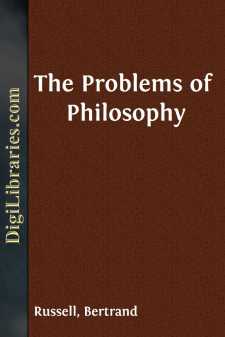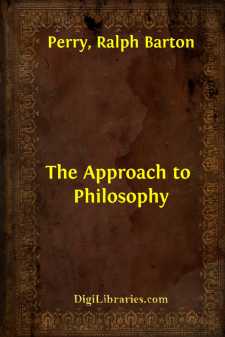Categories
- Antiques & Collectibles 13
- Architecture 36
- Art 48
- Bibles 22
- Biography & Autobiography 813
- Body, Mind & Spirit 141
- Business & Economics 28
- Children's Books 12
- Children's Fiction 9
- Computers 4
- Cooking 94
- Crafts & Hobbies 4
- Drama 346
- Education 46
- Family & Relationships 57
- Fiction 11826
- Games 19
- Gardening 17
- Health & Fitness 34
- History 1377
- House & Home 1
- Humor 147
- Juvenile Fiction 1873
- Juvenile Nonfiction 202
- Language Arts & Disciplines 88
- Law 16
- Literary Collections 686
- Literary Criticism 179
- Mathematics 13
- Medical 41
- Music 40
- Nature 179
- Non-Classifiable 1768
- Performing Arts 7
- Periodicals 1453
- Philosophy 64
- Photography 2
- Poetry 896
- Political Science 203
- Psychology 42
- Reference 154
- Religion 513
- Science 126
- Self-Help 83
- Social Science 81
- Sports & Recreation 34
- Study Aids 3
- Technology & Engineering 59
- Transportation 23
- Travel 463
- True Crime 29
An Introduction to Philosophy
Categories:
Description:
Excerpt
I. INTRODUCTORY
CHAPTER I
THE MEANING OF THE WORD "PHILOSOPHY" IN THE PAST AND IN THE PRESENT
I must warn the reader at the outset that the title of this chapter seems to promise a great deal more than he will find carried out in the chapter itself. To tell all that philosophy has meant in the past, and all that it means to various classes of men in the present, would be a task of no small magnitude, and one quite beyond the scope of such a volume as this. But it is not impossible to give within small compass a brief indication, at least, of what the word once signified, to show how its signification has undergone changes, and to point out to what sort of a discipline or group of disciplines educated men are apt to apply the word, notwithstanding their differences of opinion as to the truth or falsity of this or that particular doctrine. Why certain subjects of investigation have come to be grouped together and to be regarded as falling within the province of the philosopher, rather than certain other subjects, will, I hope, be made clear in the body of the work. Only an indication can be given in this chapter.
1. THE BEGINNINGS OF PHILOSOPHY.—The Greek historian Herodotus (484-424 B.C.) appears to have been the first to use the verb "to philosophize." He makes Croesus tell Solon how he has heard that he "from a desire of knowledge has, philosophizing, journeyed through many lands." The word "philosophizing" seems to indicate that Solon pursued knowledge for its own sake, and was what we call an investigator. As for the word "philosopher" (etymologically, a lover of wisdom), a certain somewhat unreliable tradition traces it back to Pythagoras (about 582-500 B.C.). As told by Cicero, the story is that, in a conversation with Leon, the ruler of Phlius, in the Peloponnesus, he described himself as a philosopher, and said that his business was an investigation into the nature of things.
At any rate, both the words "philosopher" and "philosophy" are freely used in the writings of the disciples of Socrates (470-399 B.C.), and it is possible that he was the first to make use of them. The seeming modesty of the title philosopher—for etymologically it is a modest one, though it has managed to gather a very different signification with the lapse of time—the modesty of the title would naturally appeal to a man who claimed so much ignorance, as Socrates; and Plato represents him as distinguishing between the lover of wisdom and the wise, on the ground that God alone may be called wise. From that date to this the word "philosopher" has remained with us, and it has meant many things to many men. But for centuries the philosopher has not been simply the investigator, nor has he been simply the lover of wisdom.
An investigation into the origin of words, however interesting in itself, can tell us little of the uses to which words are put after they have come into being. If we turn from etymology to history, and review the labors of the men whom the world has agreed to call philosophers, we are struck by the fact that those who head the list chronologically appear to have been occupied with crude physical speculations, with attempts to guess what the world is made out of, rather than with that somewhat vague something that we call philosophy to-day....









